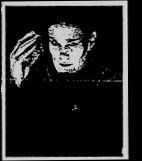 |
|||
Philippou went to America and persuaded
the multi-talented performance artist Laurie Anderson and playwright Steven Sater to work wth him. Anderson was charged with filling the play with strange noises, Sater with shredding the text to bits. Scenes have been carved up and lines reassigned. Technical wizardry enables just three actors to take on those roles that haven't been axed, their miked voices altered live via a digital mixing desk. Ariel and Caliban, slaves to the castaway Duke of Milan, have been confined to a video monitor, as a pair of eyes and a mouth respectively. Prospero, whose island has become a large table strewn with jars, is played by a feather-bearded lady - Rose English. |
|||
There are several reasons why this
writer and performer - born in 1950, the same year as Andersen - should
have captured Philippou's imagination. For one thing, English has a tendency to slip her statuesque form into outlandish costumes. In 'My Mathematics' (1994), she vied for attention with an on-stage horse by fluttering six-foot-long false eyelashes. But it is her ongoing fascination with stage magic and the metaphorical potential inherent in theatre as an ephemeral form, the way it fleetingly conjures something from nothing 'as she puts it, that convinced the 38-year-old director she would have much to bring to this Tempest', with its Beckett-inspired conceit that the action is taking place in a looped repeat inside the head of Shakespeare's austere caster of spells. Philippou describes the show as 'a psychic journey'. He believes that Shakespeare's last play attempts something that tent really seen again until Strindberg. ‘It's a play of the mind. The narrative itself is hardly engaging. What you get is the sense of a someone looking back over a lifetime, using art to turn it into something bearable. I'm not looking to provide an interpretation of the play, though, that’s really reductive,' he adds, refusing to be drawn on specific intentions behind the portrayal of Prospero as female or the use of technology. 'Nothing should be disavowed,' he says. Philippou has been acting as matchmaker between past and present for a number of years now. Havlng taken over the running of ATC in 1993, he has steered the company towards a more radical remit, bringing in new writers to build on the legacy of dead ones. Most notably under his aegis, Mark Ravenhill has produced a sex, drugs and Foucaurt-filtered modem 'Faust' and ‘Handbag’ the anguished look at Victorian and modem parenting that took its cue from ‘The Importance of Being Earnest'. Inevitably there has been controversy: "People get angry more often in theatres. I've had people storm out of these productions, screwing their programmes up and throwing them at the usher. I think that's fascinating. When l took my only other Shakespeare production Venus and Adonis', to Mexico, they were horrified that we used Madonna to provide the soundtrack. A woman said, "We didn't realise you'd be using that whore's music with Shakespeare." Presumably Laurie Anderson won't get quite that treatment here, but the defenders of Shakespeare's honour are notoriously brazen. 'We're waiting for the attacks,' Philippou says, wth audible eagerness. |
|||